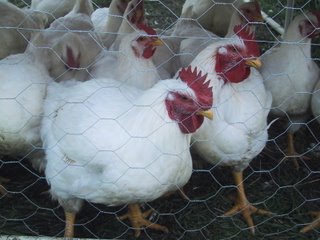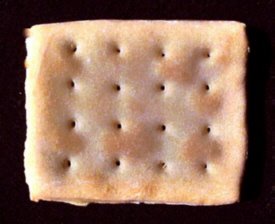Retro Musings from a Goat Cheese Farm, Part II

(This is part 2 of a 3-part journal of my experience at the Quillisascut Farm School in 2004. If anyone is squeamish, be warned that I discuss butchering.)
5:30 am The Passion of the Lamb
Surreal. Thats the word of the morning. Were standing outside in the cold and dark. The steady buzz of industrial lights is behind us while the tractor hums in front. Theres the lamb, hung from the loader high in the air from its back legs, splayed out and tied with rope. Rick is standing there in his coveralls, knife at his side, blood on the ground beneath the lamb. He shot it with a bullet maybe 15 minutes earlier and then slit its throat. I heard it while I lay in bed, waiting for it. Now we watch and help as he butchers it.
It's hardly surprising that throughout the butchering process, the closer we get to what we recognize as primal cuts, the more comfortable we all get. The whole process is amazingly clean. Theres not much blood at all and if you are careful removing the organs, theres really nothing much at all to clean up. The most difficult task is removing the lambs coat. The lanolin in and around the lamb's coat gets on our skin and if it werent for the gamey smell, I would have left it on all day.
2 hours later, we finish up, the lamb is split in half and ready to hang in the walk-in for several days.
8:45 am Cheese-making with Lora Lea
The morning milking crew has left large buckets of goat milk in the milking room. 30 goats give about 17 gallons of milk in the fall, much more when the kids are born. They only milk once at this time of year, twice daily in the spring. But first, before we use it all up, a little metal milk jug with a handle is personally delivered down the hill to Lora Leas mom, Daisy Mae, who claims her long life is due to drinking fresh goat milk.
We make 4 types of cheese: mozzarella, ricotta, chevre and a dry, salt-rubbed grating cheese. The mozzarella and ricotta are ready to eat right away; the chevre and the grating cheese will be ready in a few days. We are all amazed that the hard cheese will be ready so quickly. Of course it can be aged, leading to a curado type but it is also delicious now. Its simpler, with less complexity, but still very good.
There is definitely a science to cheese-making but I was surprised at just how much artisanry and personal touch is involved.
11:00 am Burnt nuts.
We head out to the garden and turn over a long bed to get it ready to plant garlic bulbs. The soil here is gorgeous, but it wasnt always. Years and years of amending it with chicken manure from a local chicken farmer (who thought they were crazy for taking it) plus their own compost. They grow all the usuals, and have a very healthy volunteer borage crop that we are encouraged to use up. The borage leaves that are large are usually very fishy and pokey, but strangely the leaves here, even the larger ones are mild.
After lunch, we go for a walk near the farm and harvest watercress down by a little creek. Soon we are also gathering rosehips, elderberry, and amazingly, pine nuts. I promise right here never to let a sheet tray of pine nuts burn again. Now I know how much work goes into harvesting pine nuts. Its probably done mechanically but nonetheless, it took me forever just to pry one little tiny nut from its outer shell. I think it was a Ponderosa we got the pinecone from. Later we make rosehip and elderberry syrups and use the watercress to top one of the 15 pizzas we make for dinner in the wood-burning stove.
1:45 pm Sorry Al.
Al Kowitz, from the WSU Stevens County Extension drops by to give us a lecture on pastured and grass finished meat. I feel very bad for this man. We have just finished lunch, we are all very, very sleepy. What he is talking about is very interesting but the lights are out, and hes showing us slides and we are sitting on couches. I look to the others in the group and one by one I see all their heads falling forward and then back and I realize Im sunk. The point is that I cant tell you very much about Al Kowitz and pastured and grass finished meat.
(The last part of this journal will be posted tomorrow.)


0 Comments:
Post a Comment
<< Home